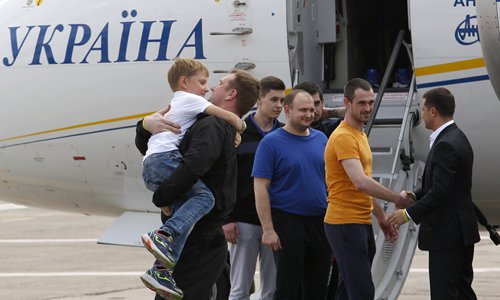HOME >> OPINION
Prisoner exchange sign of easing tensions
By Li Yonghui Source:Global Times Published: 2019/9/11 19:03:40

A recently exchanged Ukrainian prisoner embraces his son upon arrival in Kiev after Russia-Ukraine prisoner swap, at Boryspil International Airport on September 7, 2019. Photo: VCG
Russia and Ukraine each exchanged 35 prisoners on Saturday. The swap brought international praise and is hoped to ease tension between the two countries.
Russia-Ukraine ties almost broke down after the crisis in Ukraine began in November 2013. Moscow annexed Crimea in March 2014 and sent volunteers to help pro-Russian separatists to fight Ukrainian soldiers in eastern Ukraine. Kiev didn't expand the Russian-Ukrainian Friendship Treaty after it expired on April 1 and withdrew on May 22 from three separate treaties within the Commonwealth of Independent States, a regional organization headed by Russia.
After Volodymyr Zelensky was elected Ukrainian president in April, the Kremlin simplified in May the procedure for granting Russian citizenship and passports for migrants from Crimea and the Donbas. The decree signed by Russian President Vladimir Putin was to make clear that when it comes to blood bonds, Russia has not lost Ukraine. In addition, Russia has banned its own companies from exporting oil products, LPG and coal to Ukraine from June 1 without special government permissions, according to a Reuters report.
However, after Zelensky took office in May, both Moscow and Kiev thought there is a possibility for the two sides to improve their relations during Zelensky's tenure. They wish to show goodwill by swapping prisoners and mitigate their relations.
From the standpoint of Russia, its simplified procedure for granting Russian citizenship for migrants from Ukraine will attract some pro-Russian Ukrainians and pressure the Ukrainian government, which fears further splits in the country. On August 15, Moscow has offered to provide citizenship to about 3 million Ukrainians from war-torn regions.
On the other hand, Russia wishes to use the swap of prisoners as an exchange for relief from the Western sanctions on it. The number of prisoners exchanged and the carefully negotiated process show that Moscow is interested in improving ties with the Zelensky administration. Although it is very hard for the two countries to implement the Minsk Protocol in the foreseeable future, reducing conflicts at border areas and easing tensions are realizable.
Any move to promote détente in the Donbas could avoid further sanctions on Russia by the West. The sanctions on Russia over Ukraine are not likely to be completely lifted or escalated.
As for Ukraine, the first problem faced by Zelensky is national unity and territorial integrity. The annexation of Crimea to Russia is likely irreversible. Such being the case, Zelensky has likely taken the improvement of relations with Moscow as his priority with the aim of ending the conflicts in the eastern Ukraine, appeasing its people and preventing more people from migrating to Russia.
After the symbolic prisoner swap between Moscow and Kiev raised hopes that prolonged conflict was coming to an end, Putin agreed on Sunday to convene a Normandy format meeting to make progress on stopping hostilities in the eastern Ukraine, the Xinhua News Agency reported that same day.
Economic development is another concern for Zelensky, who was elected after a landslide win. To award his voters, Zelensky will have to implement more pragmatic policies toward neighboring Russia to better trade ties between the two countries. From this aspect, the lifting of Russia's sanctions on Ukraine is what Zelensky expects.
We can see that Moscow is anticipating improved ties with Kiev during Zelensky's tenure, while the Ukrainian president also knows the pressure and risks strained relations with Russia pose to his country. The exchange of detainees reflects Zelensky's courage to seek a way out, but he reiterated that Ukraine should be aligned with the West and the Crimea issue must be solved before starting talks about the Donbas. This could be an issue for Russia as it thinks the Crimea issue has been settled.
We still cannot say whether negotiations between Moscow and Kiev will carry on or whether Zelensky can show his diplomatic capabilities in balancing Russia with the US and the EU, especially in issues involving NATO.
The author is a research fellow in the Institute of Russia, Eastern European and Central Asian Studies at the Chinese Academy of Social Sciences. opinion@globaltimes.com.cn
Posted in: VIEWPOINT